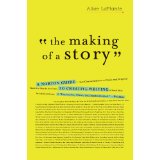 I’m reading The Making of a Story by Alice LaPlante. It’s a good book that covers the basics of creative writing. Here is one of the passages that caught my attention. It talks about the importance of finding your real, unique voice. About the importance of avoiding the “writerly voice”.
I’m reading The Making of a Story by Alice LaPlante. It’s a good book that covers the basics of creative writing. Here is one of the passages that caught my attention. It talks about the importance of finding your real, unique voice. About the importance of avoiding the “writerly voice”.
This is how Alice LaPlante puts it:
Something happens sometimes when we sit down to write. We want what we write to be Important, we want it to Matter, and so we can get pompous. We can sound like we’re making proclamations instead of observations. Or, we can try too hard to make the language sound sophisticated that it comes off flowery and overwrought. I’ve often scrawled on students’ early papers: “This feels too ‘written.’”
– Alice LaPlante, The Making of a Story
To support her point, Alice gives us a short passage from a letter Anton Chekhov wrote to the novelist Maxim Gorki, as an example of what not to do. Here it is:
It is intelligible when I write, “The man sat down on the grass”; it is intelligible because it is clear and does not impede the reader’s attention. Conversely, I will be unintelligible and tax the reader’s brain if I write: “The tall, narrow-chested man of average build, who had a short, red beard, sat down on the green grass, already trampled by passerby; sat down noiselessly, timidly, and fearfully glancing around him.” One’s brain cannot grasp this at once, yet fiction must be grasped at once, on the spot.
– Anton Chekhov to Maxim Gorki
It made me think of a similar piece of advice which came from Stephen King. It went something like this: kill your darlings! Now, don’t worry. This bit of brilliant advice from the master of horror is way less sinister than it first sounds. I’ll try to explain it in another post.
For now, I’ll just say something about Chekhov and his man sitting on the grass. I agree 100% that giving us all that information about how the man looks and the different ways he sits on the grass only slows the story down. But, for myself, I would have went something like this:
“The man sat down on the grass. He shot fearful glances around him.”
For some reason, that information seems important to me. There is a big difference between a man who sits down without a care in the world, and one who can’t enjoy this brief moment of rest because he is scared of something (or someone).
Anyway, what I wanted to do with this post is to show that, any advice, no matter where comes from or how good it sounds, has to be changed to suit our voices and our styles. “The man sat down on the grass” might have been enough for Chekhov. Me? I felt the need to give a little more information than that.
I’m still very glad I read Chekhov’s advice. I learned something from it even if I had to change it a bit.
*****
P.S. It’s time for me to approach this “self-taught writer” journey in a more organized way. I’ll spend more time learning the basics of creative fiction before tackling “complex story-telling”. I have plenty of ideas in my head, but I struggle with putting them down on paper. I figure my vocabulary, grammar, and narrative skills need a good workout.
That’s why I started reading books like The Making of a Story.
 Ada Ireland is a pen name I came up with for myself. Unashamed Writing is a name I came up with for my blog.
Ada Ireland is a pen name I came up with for myself. Unashamed Writing is a name I came up with for my blog.